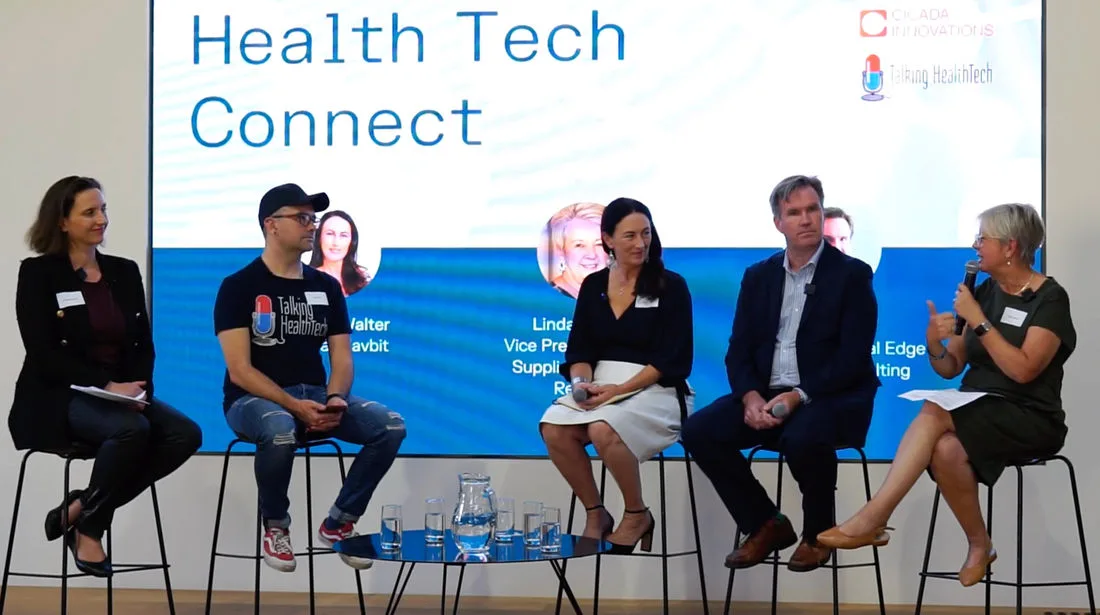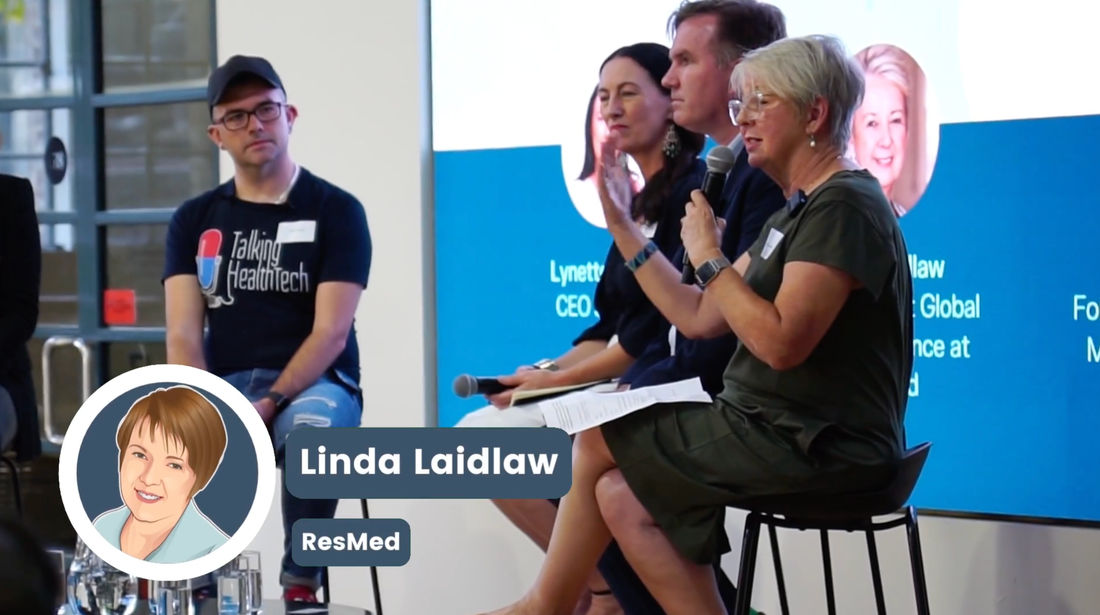Talking HealthTech: 350 – Connecting Founders & Industry

Source: talkinghealthtech.com

Provided by:
Talking HealthTech
Published on:
19 May 2023
In the intricate world of medical technology, gaining insights into key players, their motivations, and strategies is crucial. This episode provides an in-depth look at the medtech landscape from both the start-ups striving for recognition and established corporations seeking innovative investments.
This episode was recorded at a live event held in partnership with Cicada Innovations. The conversation was moderated by Dr Katja Beitat from Cicada Innovations and Peter Birch from Talking HealthTech. Featured on the panel were: Lynette Walter – CEO of Navbit. Linda Laidlaw – Former Vice President Global Supplier Alliance at ResMed. Mark Flynn – Global Edge MedTech Consulting.
In this session the speakers explore how we can bridge the gap between early-stage innovation and market adoption in the rapidly evolving health tech landscape? They look at the challenges of integrating innovative technologies like AI, IoT, digitally enabled devices, and nanotechnology into the healthcare industry.
The Human Factor in MedTech
The role of people in the medtech ecosystem is indispensable. The motivations, risk tolerance, and responsibilities of those you interact with are pivotal considerations. A deep understanding of these facets enables you to customise your approach, fostering productive conversations and partnerships.
Decoding Diverse Corporate Perspectives
Different corporations have distinct perspectives and criteria, making it vital to comprehend these differences when dealing with large corporations. Companies like Medtronic, Boston Scientific, J&J, ResMed, and Cochlear all operate on different scales and strategies, which influence their engagement with new ventures and potential partnerships.
Aligning with Corporate Strategies
A thorough understanding of a company’s strategy, direction, and goals is essential before any engagement. Recognising such preferences allows start-ups to approach companies whose goals align with theirs.
The Art of Fit and Growth Evaluation
Many Corporations place high importance on fit and potential for growth in their evaluation criteria. They are primarily interested in incremental revenue and profit, either directly or through channel growth. Understanding the channel, its players, and the market’s potential reaction to a new product or innovation is a critical part of this evaluation.
Building Trust and Authentic Connections
Building trust and authentic connections are also integral to the process. Companies need to believe in the potential of the start-up, its team, and its technology. They want to see that the start-up has the right people who can deliver on their roadmap and milestones. Usually, an investment is made to start a relationship and help the start-up get to the next stage.
The Importance of Robust Financial Modelling
A robust financial model is another aspect that corporations look for. It may not necessarily align with the corporation’s view, but it shows the start-up’s thinking process and their approach to penetrating their target market.
Risk Mitigation and Timelines
Risk mitigation is a top priority for corporations. They need to see that you have ticked all the necessary boxes, such as securing reimbursement, regulatory approvals, and completing clinical trials. Understanding the timeline for commercialisation, being realistic about it, and knowing the level of investment required are crucial elements to communicate to potential corporate partners.
The Power of Personal Relationships in MedTech
Building personal relationships is key in this journey. Building these relationships often involves spending time in the regions where decision-making is happening, understanding the dynamics of local competition, and being persistent. Every meeting is an opportunity to learn and build trust, and should be treated as such.

The Importance of Persistence and Plan B
It’s important to have a Plan B, and persistence is key. The journey to securing investment can be long and arduous, and success is not guaranteed. But each meeting, each pitch, is an opportunity to learn, to refine your strategy, and to build relationships.
Embracing the Startup Experience
In the startup world, being innovative doesn’t mean being risk-free. It’s about understanding the market, the financials, and how to navigate the complex startup ecosystem. It’s a fine balance between risk-taking and strategic planning. But there’s more to it. You need to understand the people and their roles in the startup ecosystem.
The Role of Collaboration Coordinators in MedTech
Collaboration coordinators like Mark on the panel in this episode, act as a bridge between start-ups and potential partners, facilitating discussions and current plans to tackle an unforeseen issue. Therefore, the key to securing a strategic partnership is to provide solutions, not create more problems.
Patience and Perseverance in the Corporate World
The process of forming strategic partnerships demands patience, focus, and an understanding of the other party’s needs. As a startup, you should present a blueprint that makes sense to the industry, one that can be scaled and de-risked with minimal effort. It’s crucial to remember that the corporate world often works at a different pace, and your timelines may not align. Perseverance is key in these situations.
The Role of the Startup Collaborator: Mark’s Story
Mark serves as an exemplary startup collaborator, mediating and facilitating discussions. His responsibilities extend beyond mere conversation coordination; he identifies potential pitfalls and provides valuable insights, particularly beneficial to founders eager to sidestep common missteps.
His tenure at Cochlear and Demands, both highly specialised companies, gifted him a unique perspective on the struggles med tech startup founders face. When transitioning to a neurostimulation startup, Mark experienced the challenge of forging connections without the backing of a large corporation.
Overcoming the Networking Challenge
In the startup world, you lack the luxury of a sales force or regional sales manager. Meeting key opinion leaders (KOLs), surgeons, engineers, or university professors can be daunting without the support of a corporate structure. Mark devised an innovative solution. By hanging out in hospital cafeterias, identifying potential contacts by their badges, he could introduce himself over a casual coffee. This approach enabled him to build a network from scratch.
However, networking is not just about making connections; it’s about connecting with the right people. Platforms like LinkedIn can be instrumental in understanding a company’s organisational structure and pinpointing decision-makers.
Decoding the Corporate Landscape
A crucial lesson Mark learned is that corporations often fail to grasp the challenges startups face. Accustomed to readily available resources and connections, they overlook the hurdles startups encounter.
Pitching to a corporate entity, such as Cochlear or ResMed, necessitates a different strategy than when seeking VC funding. It’s about understanding their challenges and demonstrating how your innovation can alleviate them. If you can aid Cochlear’s global mission of increasing cochlear implant awareness and transitioning people from hearing aids to implants, they’re more likely to be receptive.
Concluding Thoughts on Navigating the Startup Ecosystem
Ultimately, it all boils down to understanding your audience, be it a VC, a corporate entity, or a potential collaborator. Comprehend their challenges, tailor your pitch to their needs, and adopt a proactive approach. The startup world can be brutal, but with the right mindset and strategies, you can successfully navigate this path.
Key Insights for Successful Partnerships
-
Realistic Expectations: Understand the intricacies of the technology you aim to innovate upon and come prepared with a realistic plan.
-
Understanding Mutual Reluctance: Overcome the inertia in engaging with industry partners by understanding their needs and offering solutions.
-
Empathy and Problem-Solving: Put yourself in the shoes of potential partners and focus on their challenges rather than yours.
-
Navigating Different Timelines: Be aware of the different pace of startups and corporations and plan accordingly.
-
Building Relationships: Foster relationships at every level within the organisation to ensure a strong partnership.
-
Understanding Corporate Product Plans: Align your offering with the corporation’s long-term plans and regulatory strategies.
-
Role of Problem-Solving: Provide solutions to existing problems rather than introducing new ones.
-
Patience and Perseverance: Forming strategic partnerships demands patience, focus, and understanding of the other party’s needs. It’s a marathon, not a sprint, and perseverance will be key to your success.
-
The Value of a Mediator or Collaborator: Someone like Mark, who understands both the startup and corporate world, can provide invaluable guidance and support during the partnership process.
-
The Importance of Networking: Building a solid network is crucial, especially in the startup world where you may not have the support of a large corporation.
-
Identifying Decision Makers: It’s not just about making connections, but making the right connections. Understand the corporate structure and identify the key decision-makers who can influence the partnership.
-
Understanding Corporate Challenges: Recognize that corporations have their own challenges, and tailor your pitch to show how your solution can help overcome them.
-
The Art of Pitching: Tailor your pitch to the audience you are targeting. Understand their needs, their challenges, and how your solution fits into their larger mission or objectives.
-
Adopting a Proactive Approach: The startup world is fast-paced and dynamic. Stay ahead of the curve by being proactive, whether it’s in networking, understanding your audience, or devising solutions to challenges.
-
Resilience: In the startup ecosystem, you will face numerous challenges and roadblocks. Resilience is key to overcoming these hurdles and moving forward.
Navigating the startup ecosystem and securing strategic partnerships can be a complex process, but with the right strategies, mindset, and understanding of the corporate world, you can increase your chances of success. Remember, it’s not just about developing a groundbreaking product or solution, but also about demonstrating its value to potential partners and showing how it aligns with their needs and challenges.


